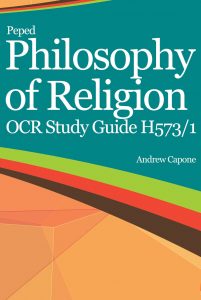Specification H573/1 Cosmological Argument
January 6, 2018
 The cosmological argument is an a priori argument for God’s existence that moves from premises to conclusion without direct appeal to evidence. It comprises one of Aquinas’ five ways for establishing the probability of God’s existence. David Hume attacks all arguments for the existence of God in his Dialogues Concerning Natural Religion – a debate between characters who take slightly different positions on the issues arising. The key documents are hyperlinked below and there is also a hyperlink to Michale Palmer’s excellent textbook (see chapter 2) which you can read and note online. PB
The cosmological argument is an a priori argument for God’s existence that moves from premises to conclusion without direct appeal to evidence. It comprises one of Aquinas’ five ways for establishing the probability of God’s existence. David Hume attacks all arguments for the existence of God in his Dialogues Concerning Natural Religion – a debate between characters who take slightly different positions on the issues arising. The key documents are hyperlinked below and there is also a hyperlink to Michale Palmer’s excellent textbook (see chapter 2) which you can read and note online. PB
We have now produced study guides for each paper which build essay-writing (analytical and evaluative skills) step by step, and together with the handouts and marked essays on the website, provide a complete method of mastering this subject. If you need a tutor, please contact me as I have a group of experienced teachers available now. peterbaron@peped.org
2. The Existence of God: Cosmological Argument
Learners will study contrasting arguments about the existence or non-existence of God.
2.1 Content
• the cosmological argument
• challenges to arguments from observation
2.2 Knowledge
• details of this argument including reference to:
– Aquinas’ first three ways
• details of Hume’s criticisms of this argument for the existence of God from natural religion
2.3 Issues as the basis of exam questions
Learners should have the opportunity to discuss issues related to arguments for the existence of God based on observation, including:
• whether a posteriori or a priori is the more persuasive style of argument
• whether cosmological arguments simply jump to the conclusion of a transcendent creator, without sufficient explanation
• whether or not there are logical fallacies in these arguments that cannot be overcome
2.4 Suggested scholarly views, academic approaches and sources of wisdom and authority
For reference, the ideas of Aquinas and Hume listed above can be found in:
• Aquinas, Summa Theologiae, I.2.3
• Hume, Dialogues Concerning Natural Religion Part II
Learners will be given credit for referring to any appropriate scholarly views, academic approaches and sources of wisdom and authority, however the following example may prove useful:
• Palmer, M. (2002) The Question of God, Routledge, Chapters 2 and 3






0 Comments